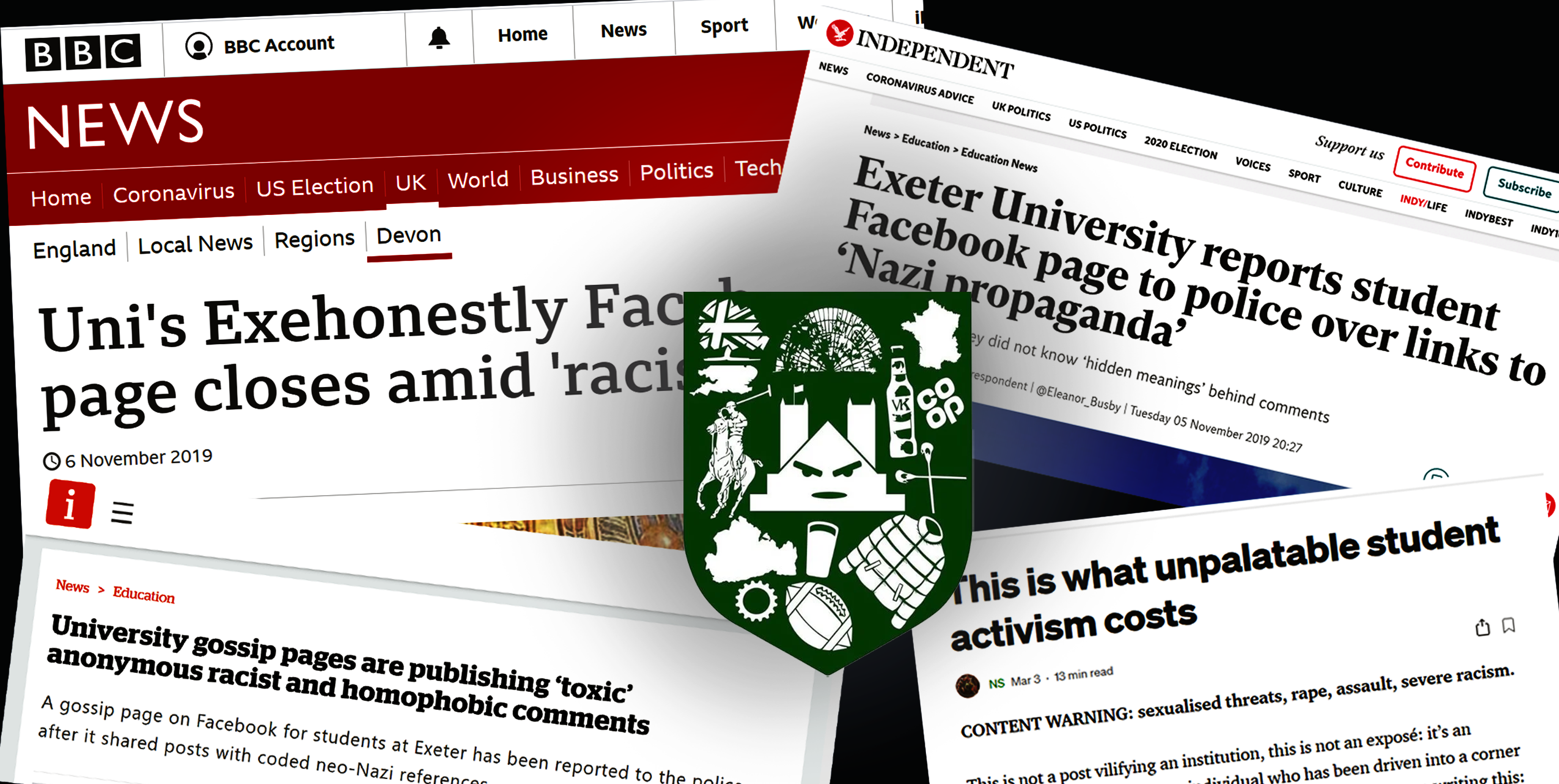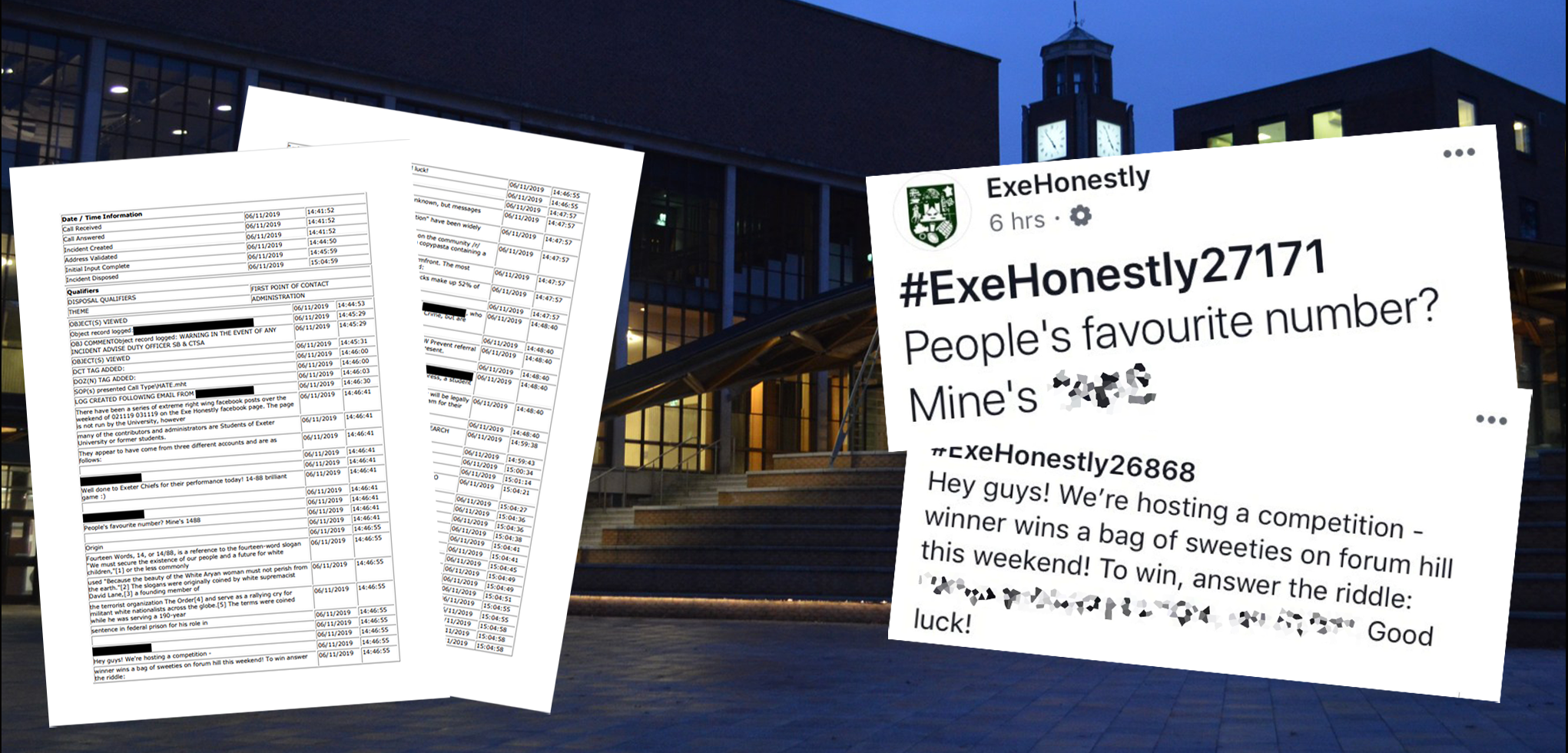Student confessed to University over neo-Nazi posts, abuse victim not told

CONTENT WARNING: Racism, far-right imagery, mention of sexualised abuse
An Exeter student admitted to the University that they were responsible for “at least one” of the neo-Nazi ExeHonestly posts made in November 2019, Exeposé can reveal.
Obtained through a Freedom of Information request, the police incident log from 6 November also explains that the submissions “appear to come from three different accounts.”
UniTruths, who hosted the confessions page, claim that “No personal identifying details are taken or held by the site” but these have been redacted in the report under GDPR legislation.
PhD student NS was closely involved in the investigation after the posts were connected to a series of extreme racist and sexually abusive emails she received, as well as acts of stalking and assault; detailed in her Medium article ‘This is what unpalatable student activism costs’.
She had previously been called a racial slur in another post on ExeHonestly, while the page’s administrators signalled her to blame for its shutdown, leading to the Students’ Guild to denounce them for “targeting individual students who first called out the hate speech.”
An email sent to NS by senior management three days after the police noted a student had confessed said: “it is possible [the police] may identify names.”
It added that if she was “able to log a formal complaint,” then the University would be in a position to deploy disciplinary procedures “if they are students.”
A University of Exeter spokesperson would not confirm whether or not the student had faced any disciplinary action, saying “A student did admit to posting an extremist message on ExeHonestly. This information was passed to the police and relevant authorities and we followed the University’s disciplinary process. We cannot share further confidential information about the individual.
“We are committed to taking all steps necessary to tackle extremism and becoming an anti-racist university.”
Following 2018’s Bracton Law Society scandal (BLS), in which students exchanged racist messages in a WhatsApp group chat, the University did announce that some had been suspended or expelled.
They did not answer why the student body was not made aware of the confession.
The University’s disciplinary procedure explains that, while statements and documentation will be circulated among the the Major Disciplinary Board and the student, “later circulation may be allowed at the discretion of the chair.”
They also note that they “may recommend to the Guild the imposition of a ban from specific Guild outlets and/or Guild commercial activities.”
“An officer of the Students’ Guild or Athletic Union President” would also sit on the Disciplinary Board.
A Guild spokesperson said: “The University doesn’t disclose disciplinary issues or cases with the Guild, as per the normal process, so we were not aware of this individual case.
“We hope on this occasion that the right action was taken, and where the University is made aware of hate crime or harassment including racism within the student community, that they take appropriate action in the future too.
“The Guild takes a zero-tolerance stance on hate crime in our community.”

Background image: Harry Caton
After finding out about the student’s admission, NS said: “The degrees of dishonesty apparent here seem almost farcical. Needless to say, I am simultaneously astounded and sickened by the opacity of a system claiming to be transparent.
“The student who posted the dogwhistle remains anonymous thanks to the University – the student who called it out has been splashed front and centre.
“I was constantly led by the University to believe that the perpetrators of these postings would be connected to the racialised, sexualised abuses, stalking and harassment I had undergone through the year. I believed them.
“That the University knew who one of these perpetrators were all along whilst encouraging me to file this complaint and that report, is utterly disgraceful.
“I got an email from a member of senior management, three days after the police report implied a confession from a culprit, insinuating that I should file a formal complaint against the ‘anonymous’ ExeHonestly posters as that would be the only way the University could engage its disciplinary procedures. I feel used and clearly have been taken on a donkey ride across the year.
“I remember during the BLS issue, the University promised and delivered transparency on sanctions for racism. Is this change of heart now due to fears of a witch hunt against a perpetrator? That fallacy then, is heartbreaking.”
The student who posted the dogwhistle remains anonymous thanks to the University
NS
The case was referred to the Counter Terrorism Police South West Prevent Team due to the “worrying extreme right-wing ideology present”, and the report concludes that the University “will be legally bound to pass the details of the student to [them] for their enquiries” under the Counter-Terrorism and Security Act of 2015.
A Devon & Cornwall Police spokesperson said: “detectives with the Force’s Prevent team worked with the University’s safeguarding team to identify the author of one of the offending posts who subsequently apologised for his actions in a statement, confirming that he deleted his post very soon after posting it.”
However, the structure of the confessions page means that only administrators are able to delete posts, and were left up for several hours.
The statement continues: “It is understood that the Facebook page was deleted soon after the incident.
“The matter was left in the hands of University safeguarding officials.”
In a July interview with the Tell A Friend podcast, former Vice-Chancellor Sir Steve Smith answered a question about racism at Exeter by explaining how the University contacted Facebook’s management to try to get “certain pages banned”, and had “spent a fortune in finances” in an attempt to identify the people behind “one particular incident recently.”
He continued: “We would have acted immediately to expel those people if we’d found out – we did not find out, and could not find out, who those individuals were.”
A University spokesperson denied that this Facebook page was ExeHonestly, saying: “The case our former Vice-Chancellor refers to in an interview is different and relates to extremist and abusive messages to an individual. We did not find the perpetrators in that case.”
It is unclear which Facebook page he may then be referring to.
One of the posts made last November read: “People’s favourite number? Mine’s 1488.”
The number is a reference to a white supremacist slogan coined by convicted felon David Lane, a founding member of neo-fascist terrorist organisation The Order.
A similar “confession” congratulated the Exeter Chiefs for winning “14-88”, and was approved by moderators despite the real score being 20-24.
Another post claims to offer “a bag of sweeties on Forum Hill” if users can answer the riddle “What accounts for 13 per cent, yet 52 per cent?” The number is described by the Anti-Defamation League as referencing “racist propaganda claims by white supremacists.”
The incident made national news in the BBC and Independent, as the University reported the page to the police.
The matter was left in the hands of University safeguarding officials
Devon & Cornwall Police spokesperson
ExeHonestly’s administrators claimed that “if we were aware of [the posts’] true meaning, they would have not been posted” while also arguing that the page was “well regarded by the local community for providing mental health support.”
The University responded: “A ten second internet search would have indicated that the latest posts were offensive to everyone in our community.”
Students’ Guild Officers also rejected their explanation, saying “The idea that a platform which allowed fascist opinions to be posted can claim to be an important service for all students’ mental health is problematic.”
Exefess was set up by a different group less than 24 hours later, and did not respond to Exeposé when asked if they would accept the offer of diversity training from the Guild.
That page was then also reported to the police in February 2020 for hate speech, which was directed at candidates after the Guild elections.
Its sister page, Sexefess, recently posted sexually violent threats to specific committee members of a society.
The pages initialise people’s names to maintain plausible deniability against public threats, but many of its subjects are still identifiable.
If these issues affect you, you can get in touch with:
www.exeter.ac.uk/wellbeing
www.exeter.ac.uk/speakout
Exeter TALKWORKS: 0300 555 3344

